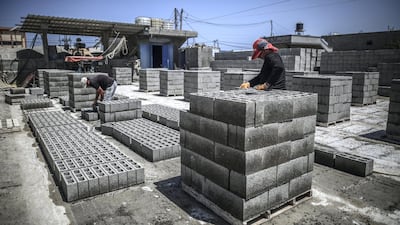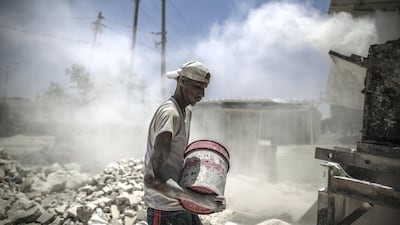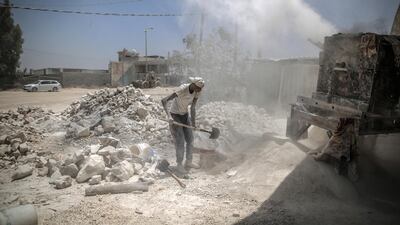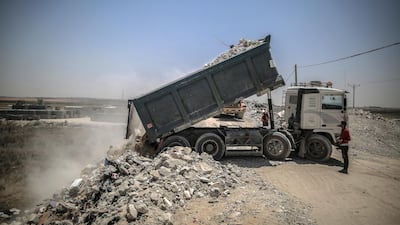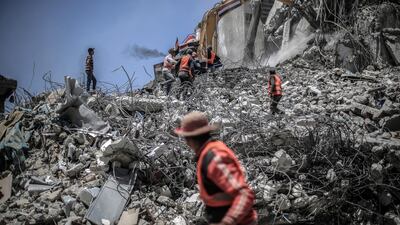The exchange of fire between Israel and Hamas through the years has seen Gaza being razed time and time again.
Now, due to ongoing restrictions on the shipment of construction material across the border, Gaza’s residents have started using the rubble from the destruction to rebuild.
At Kerem Shalom, the only commercial crossing with Gaza, Israeli authorities are currently allowing only some trucks bearing food items, animal feed, and humanitarian aid to pass. One thousand items related to the industrial or construction sectors are banned, although some materials have reportedly entered through Rafah on the Egyptian border.
Gaza has witnessed four wars in 13 years and other sporadic military attacks that have destroyed thousands of residential and economic facilities. Many of them are still in a state of disrepair, Maher Al Tabbaa, the director of public relations at the Gaza Chamber of Commerce, told The National.
The shortage of building material has led to a spike in price of existing material by more than a quarter, Israeli human rights organisation Gisha said.
Small businesses have benefited from the paucity, like the Natat stone-crushing plant. Natat is recycling the rubble to produce building materials such as aggregates and stone blocks.
"We separate the stones from the rubble and put them into the crusher, which grinds these stones into gravel," Anan Khaled Natat, who owns the crusher, told The National.
Reshaping the rubble has proved so lucrative, it has caught the eye of the government, which has begun selling the raw material to the crushers.
“After the previous war, people asked us to come and take the rubble because it was a burden,” Mr Natat said.
“But after this war the government took the responsibility of selling it. Because it has good economic value.”
The latest destruction has left as much as 300,000 tons of rubble, Ministry of Public Works and Housing's Acting Undersecretary Imad Hamadeh told The National.
The volume was far more than in 2014 because Israel this time targeted residential towers, rather than the low-rises.
While Gaza’s authorities had allowed some owners to sell their rubble soon after the ceasefire on May 21, all removals are now done only through contracts signed between the government and the companies, Gaza resident Alaa Shamali said. The 35-year-old lived in an apartment at the Anas Ibn Malik Tower before Israeli warplanes tore it down.
Still, the rubble has sustained Muhammad Al Sheikh. The 28-year-old failed to find a job after graduating in media studies from the Palestine College in Gaza in 2014. With the help of a big hammer with which he breaks the stones, Mr Al Sheikh now earns an average of about 850 shekels ($262) a month.
"I got engaged about six months ago,” the aspiring journalist said. “This has been the only work available to me for the last four years.”
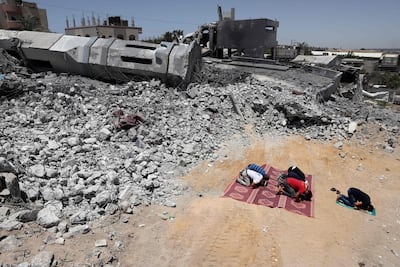
Finding a job is, indeed, difficult in Gaza. The unemployment rate was 48 per cent of the total workforce in the first quarter, the Palestinian bureau of statistics said.
Another beneficiary has been Muhammad Muqat, who goes to the border every morning to pick only the plastic from among the rubble. The five kilograms of plastic he collects daily fetches him around $7 from a merchant in the city. The trader, in turn, sells it to the plastics factories that reshape it into water pipes.
The cost of rebuilding Gaza would be about $500 million, said a Ministry of Economy official said. But differences between mediators Egypt, Qatar and the UN to create a new mechanism for the reconstruction, similar to 2014, have delayed the funds.
"We are waiting for the result of indirect negotiations with Israel to know how and when this money will enter Gaza,” said the official, declining to be identified.
The ministry is trying to remove the rubble with the help of Egyptian crews that have been allowed into Gaza. The immediate focus is on buildings that are on the brink of collapse from the air strikes.
After the 2014 war, there wasn’t enough construction material that flowed into Gaza, and the crushing plants had stepped in to meet the shortage, said Mr Al Tabbaa at the Gaza Chamber of Commerce. But to start a comprehensive reconstruction now, the Israeli siege has to end, he said.
